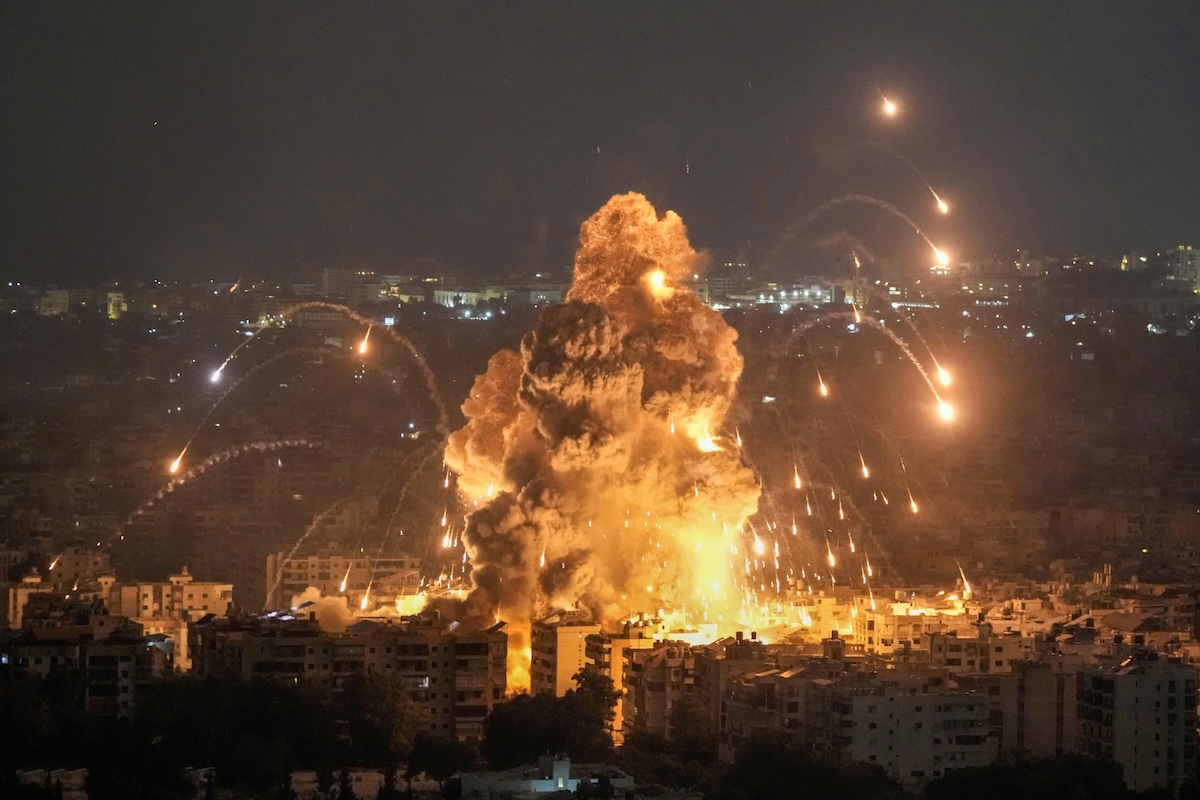Waking up in a foreign land, immediately rushing to my phone, looking up what happened last night, under the iron and the fire, while I was asleep, with nothing over my head but the stars and the cold breeze of the night. I read messages from my loved ones, some assuring me they’re OK, others telling me how scared they were, how hard it was to sleep under shaking walls and the buzzing of drones. “We grew up in this,” my parents used to say, speaking of their childhood years. “Chances are, you and your kids will go through it, too.”
So here we are, going through “it” again. Going through war.
Now that Lebanon is once again witnessing a war fought by others on its own soil, some voices have been quick to point out that such a conflict could have easily been avoided, as it had been warned against for years. For a lot of people, the presence on our territory of an Iranian-armed proxy threatening a foreign country with our population as collateral had long been unwelcome. As with the PLO, which lit the fire of the civil war in the 1970s, the fear that Hezbollah’s presence would ultimately lead to another destruction of the country had been growing for decades. The lessons of 1975 and of 2006, when parts of Beirut and the South were crushed by a senseless monthlong war between Hasan Nasrallah and Israel, were never truly learned. The little determination and indignation some harbored was ultimately crushed by the fear of joining all those who’d been “permanently silenced” by the self-proclaimed “Party of God.” For years, opposition was complacent because it was afraid, and its supporters preferred to seek refuge under the barrel’s shadow than to stand before it.
And so, in the midst of the chaos and the rubble, among the war cries and the interests of all the parties involved, a whisper rises, almost inaudible, yet striking the string of History: What about us? What about the Christians?
For the first time in the 81 years since independence, it looks like the Lebanese Christians are reduced to the role of mere spectators of their country’s destiny. The war currently unfolding will likely determine the destiny of Lebanon for the foreseeable future; and yet, it seems that the Christians will play no role in bringing that future about. Nowhere are they mentioned in the debates and proclamations, no leader is there to defend their interests, their clergies are still speaking in analogies and parables, and the main vehicle of their political influence, the presidency of the Republic, reserved for the Maronite community, remains empty in this darkest hour.
As a Lebanese Christian, it is difficult when confronted with this situation to avoid feeling a sense of usurpation and loss. The proclamation of the State of Greater Lebanon in 1920 under the French mandate was not, contrary to some simplifying narratives, merely the result of French colonial ambitions, although it certainly found in the French concourse and rule the impetus and the framework necessary for its establishment. It was also, at heart and perhaps above all, the materialization of the desire of a particular community, the Maronites, who still represent the majority of Lebanon’s Christian population and diaspora, to live in freedom. “We are a nation that loved freedom,” said the late patriarch Mar Nasrallah Sfeir. “And if we renounced it, we would renounce life.”
This is not to say that the establishment of Lebanon was “solely” a Maronite project. The Greek Orthodox, Greek Catholics, Druze, and Sunni were also represented in the three delegations that went to Versailles in 1919 to make a case for an independent Lebanese state. But it was not for nothing that all three delegations were headed by Maronites, with the patriarch himself, Mar Elias Hoayek, leading the second one, formed exclusively of members of the Maronite and Greek-Catholic clergies. The Maronite bishop Abdallah Khoury led the third delegation.
Therefore, if Lebanon was not originally meant to be a mono-ethnic state, it is fair to assume that it would not have been born as an autonomous and distinct entity without the active participation of representatives from the Maronite community, first among which were the clergy. “We would be better off dying on our rocks than joining Damascus,” patriarch Hoayek famously declared. The goal was not to create a “Maronite state” per se, but simply to establish a homeland where they and other Christians could live freely, not at the expense of, but in concord with, other communities, such as the Druze, Sunni, and Shia Muslims. This concord, however, was never to come at the expense of freedom, as made clear by the late Patriarch Sfeir in one of his homelies: “If we had to choose between liberty and coexistence, we would choose liberty.” This goes against the view, popular among many observers—including Lebanese—that Lebanon’s primary raison d’être was to serve as a model of coexistence for its own sake: it was to be, first and foremost, a project of liberty. It is, in retrospect, only logical: For without liberty, true coexistence becomes impossible.
To live in liberty, in the Maronite spirit, which is a spirit of resistance, is not merely to be allowed to live freely. Liberty is not something to be granted or conceded. Liberty is the very principle of existence. For being, as wrote St.Augustine, is the same as living sovereignly. So when we say that Lebanon was meant as a country where Christians could live freely, it means nothing less and nothing more than for Christians to have the capacity to decide on their own destiny. Therefore, when Mar Sfeir says that “[Maronites] cannot live without freedom,” it is almost, in a Maronite perspective, a tautology. To say that we cannot live without life would have been to say the same thing.
It is clear, 34 years after the end of the civil war, that the sense of this purpose has been lost to a significant part of the Lebanese Christian population, including among the Maronites. To live freely now basically means to be able to drink what one desires, eat what one desires, wear what one desires, ring the church bells, and go to Mass. As long as these things are more or less guaranteed, every compromise seems less like a treason, every step backward less like a renouncement, every word unsaid less like cowardice. Wasn’t the alliance and sympathy of some Christian parties for Hezbollah justified on the grounds that they were allegedly “protecting” the Christians? Is one really free who has willingly foregone the burden of his own protection? Freedom cannot be given, say the church bells echoing in the centuries. But it can be taken. For true liberty is proud and admits no degradation. It forgives no compromise.
Therefore, when we ask, “What about the Christians?,” we ask about more than the destiny of a particular population. We ask about the destiny of Lebanon itself as a country conceived by and for liberty. The downfall of Lebanon has coincided with the downfall of the Maronite spirit of resistance and the perversion of the historic understanding of liberty gradually installed among Christians across the land. And as this spirit had, with the foundation of the country, offered them a hope for their future, it has, with its degeneration, led them closer to the abyss. This spirit must be rekindled and cultivated anew so that we can be free again, and we will have regained that spirit when we are able once again to speak as Bachir Gemayel, its last great representative, once spoke, with words of fire:
We are the saints of the Middle East and its devils. We are its cross and its struggle. We are its light and its fire. Capable of burning it to the ground if they burn our fingers, and capable of bringing it to the light if they shall leave us with our liberty.
Now that we are looking into the darkness without a word to say or a stone to move, the words a Coptic Christian uttered during the civil war resonate even stronger amid the rubble: “You, the Lebanese Christians, are responsible for the fate of 12 to 15 million Christians in the Middle East. If you succeed, we will remain; and if you fail, we will disappear.”

